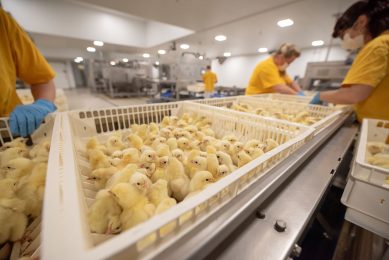An itchy issue
Nicotine is known to be a poison. Smokers, and especially non-smokers are aware of that. The poison is also known to be a very effective tool in the battle against chicken mites – often also called red blood lice. Although the latter is an incorrect term, since lice have 6 legs and mites 8 the habit and appearance of the parasite explains the confusion.
Chicken mites pose a major problem to poultry farmers, especially those who keep layers. These little creatures prefer to live in dark spots like corners and pores of houses and equipment, from where they can attack chickens at night. They do not live on chickens but feed themselves with blood from these birds by infesting the skin. After a blood meal their colour turns to light red or deep red.
Due to the enormous reproduction capability the chicken mite population can double every 6 days, and may cause serious problems in an infected flock. Serious contaminations result in anaemia, emaciation, a lower egg production, a reduced resistance against infections and an increased feed intake. Several specialists believe that chicken mites may be held responsible for the transfer of various diseases (like Salmonella, E. coli etc.). A survey carried out in 2004 by the Dutch Institute for Applied Research indicated that the Dutch poultry industry is loosing every year about €11 million due to the chicken mite. The prohibition of nearly all pesticides against chicken mites in Europe is causing serious problems for most layer farmers.
The problems have become worse since cage systems have been banned. Mites like the new litter and aviary environment and find there a fantastic condition to multiply. These housing systems require a higher labour input and force farmers to be more frequent and for a longer time span inside the house. Mites may jump on these workers causing an unpleasant itch and in some cases allergic reactions.
Since mites seem to build up resistance against various pesticides and more and more pesticides are taken off the market farmers try to find alternatives. Since most permitted alternatives seem not to do a satisfactory job it is logic that farmers who do face a serious infestation of chicken mites look for illegal remedies. Nicotine is one of those. It is very effective and seems not to harm the birds, nor their eggs and meat, but it is harmful for those who unprotected spray it on birds.
Recently a Dutch poultry service provider was fined for using nicotine to ban chicken mites. In his defence he stated that he had no choice since there are no alternatives left. According to him, the ban on cages made animal welfare groups jointly responsible for the mite control problems. Their actions, he said, resulted in chicken mite plagues in many farms, a reduced bird welfare, increased production costs, farm workers health problems and bringing chicken farmers to a point that they have to commit a ‘crime’ to assure bird welfare and health.
This is an interesting case and is going to be worth following the continuation of this itchy issue.












